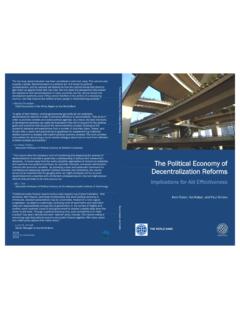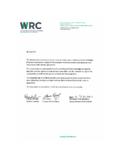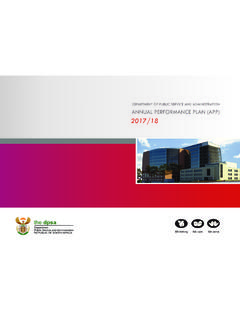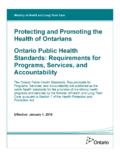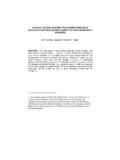Transcription of Management Accountability for Public Financial Management
1 Management Accountability for Public Financial Management By Muhammad Akram Khan, former Deputy Auditor General of Pakistan _____. Abstract The paper aims to present ideas and principles that can help Public managers understand their obligations toward Financial Management . Section one of the paper introduces the concept of Accountability and its various dimensions. Section two defines the principles of Accountability and section three identifies the actors whose Accountability is under discussion. Section four defines criteria for Accountability and mechanics of holding Public managers accountable. Section five discusses how Accountability is enforced. Section six takes the discussion a step further by identifying various issues in holding the watchdogs accountable This section discusses the mechanics of Accountability of the auditors.
2 In section seven, the paper proposes a mechanism to assess the state of Accountability in a country. The mechanism can help in identifying gaps in the existing Accountability framework and indicate policy action for strengthening it. For putting the whole discussion in a proper perspective, section eight explores constraints and challenges involved in introducing a robust framework of Accountability . It describes the dilemmas of Public managers with respect to Accountability . The last section makes policy recommendations. _____. 1. Introduction There is a recent upsurge in Public demand for the Accountability of Public servants at all levels. It has emerged from greater acceptance of democratic values and traditions around the globe. Although on a first look the idea of holding Public servants accountable seems attractive, yet a closer look unravels several issues which require discussion and policy recommendations for making the concept of Accountability of Public servants operational.
3 The objective of this paper is to present ideas and principles that can help the Public service managers understand the dimensions of their Accountability and their obligations toward Financial Management . Definition of Accountability Accountability has been variously defined. Some more common definitions are as follows: Accountability is the obligation to render an account for a responsibility conferred. It presumes the existence of at least two parties: one who allocates responsibility and one who accepts it with the undertaking to report upon the manner in which it has been discharged. 1. [ Accountability ] is the liability assumed by all those who exercise authority to account for the manner in which they have fulfilled responsibilities entrusted to 2. 1. Report of the Independent Review Committee on the Office of the Auditor General of Canada [Wilson Report], Ottawa: Information Canada, 1975, 2.
4 Final Report of the Royal Commission on Financial Management and Accountability [Lambert Commission], Ottawa: Minister of Supply and Services Canada, 19719, [A]ccountability is synonym for responsibility. It is a type of relationship that comes to existence when an obligation is taken on by an individual (or corporate entity), such as the responsibility to assume a role or discharge a task. 3. Accountability is a relationship based on the obligation to demonstrate and take responsibility for performance in the light of agreed expectations. 4. In brief, Accountability requires a relationship of conferring responsibility and reporting back on the expected and agreed performance and on the manner in which the responsibility was fulfilled. The rendering of account, whether obligatory or on a voluntary basis, establishes the relationship of Accountability .
5 The report on performance on the agreed expectations lends a sort of flexibility but increases the emphasis on Accountability for results. The agreement about expected performance could be explicit or implicit between superiors and subordinates. A robust framework of Accountability , thus, moves away from the traditional outlook of blameworthiness or catching a thief' toward reporting on results achieved as compared to agreed expectations, highlighting practical constraints and willingness to improve in the light of experience5. Dimensions of Accountability Accountability has several dimensions. For example, Accountability could be internal or external. Internal Accountability refers to rendering of account to higher echelons of the organization by lower levels in the light of delegated authority and planned targets.
6 The external Accountability refers to the Accountability of a department or agency to some external body like legislature or governing board. Accountability could be ex ante requiring a department or agency to report before an action is taken. It could be ex post, requiring to report on results of action. Accountability could also be amendatory, requiring a remedial action to redress a grievance. Accountability could be political, referring the Accountability of the executive branch of government to the legislature. It could mean managerial Accountability , referring delivery of services by government agencies or departments to the Public for a fee or otherwise or for the utilization of Public resources to deliver the services. Public Financial Management falls into this last category. The present paper deals with this type of Accountability .
7 Rationale for Accountability The rationale for holding Public managers accountable lies in the very nature of their relationship with the Public resources. They have a relationship of trust with these resources. Public would like to know how did they discharge their responsibility with regard to this trust. The degree of trust varies with the level of the Public managers. The senior managers have overall responsibility for the organizational goals; the lower level managers are accountable to the extent of the authority delegated to them. 3. Plumptre, Timothy W., Beyond the Bottom Line in Government, South Halifax: The Institute for Research on Public Policy, 1988, pp. 182. 4. Modernizing Accountability Practices in the Public Sector. A joint discussion paper by OA Canada and TBS Canada, 6 January 1998.
8 Also, Investing in the United Nations for a Stronger Organization Worldwide: Accountability (A/60/846 ), New York: UN, 2006, 5. However, it is not to suggest that sanctions or penalties should not be imposed if a person is found guilty of willful negligence, fraud or corruption. The recent emphasis on managing for results has enhanced the ability of Public managers to adopt innovative techniques in using Public resources. This has, at the same time, increased the need for greater Accountability . The Public managers should be able to answer about the manner they implemented a program, the constraints they faced and the remedial action they took. It also implies a need for independent review of the assertions made by the managers about their performance. Stakeholders in Accountability The primary and foremost stakeholders in an effective system of Accountability are the people of a country.
9 They look up to their legislative bodies for holding the executive government accountable for collection of revenue, Management of Public debt and expenditure on Public programs. At the operational level, the ministers as head of departments and ministries hold the senior civil servants accountable, who in turn hold junior levels accountable for proper execution of programs and achievement of results. Within the government the supreme audit institutions, internal audit departments, ombudsman, anti-corruption agencies, other investigating organization involved in enforcing conduct and discipline have interest in a proper functioning system of Accountability . Besides, the non-governmental organizations operating in a country remain alert to the Accountability information published by the government departments and agencies.
10 Local and internal media also have a stake in proper functioning of the Accountability mechanism. Scheme of rest of the paper The scheme of rest of the paper is as follows. Section two defines the principles of Accountability and section three identifies the actors whose Accountability is under discussion. Section four defines criteria for Accountability and mechanics of holding Public managers accountable. The section tries to explore an answer to the question: how do we know that an Accountability framework is effective ? Section five discusses how Accountability is enforced. Section six takes the discussion a step further by identifying various issues in holding the watchdogs accountable. This section discusses the mechanics of Accountability of the auditors. In section seven, the paper proposes a mechanism to assess the state of Accountability in a country.

